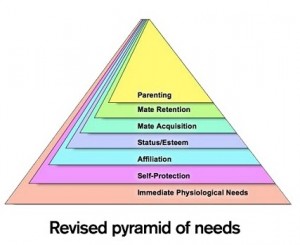 Sometimes you just want to roll your eyes and say “Duh!”
Sometimes you just want to roll your eyes and say “Duh!”
A team of researchers at Arizona State University, led by evolutionary psychologist Douglas Kenrick, has noticed that most people really like being parents. Despite the challenges of child-rearing, Kenrick reported that the warmth, the love, the creativity, the sense of purpose and belonging—all of these factors and more make parenting the most enjoyable of all activities.
Kenrick’s team reported this breaking news, which is just a ho-hum factoid to loving parents, in the journal Perspectives on Psychological Science. Kenrick and his group proposed a revision to Abraham Maslow’s Hierarchy of Needs which takes into account our deepest biological drives.
In the new Need Hierarchy, Maslow’s fifth-tier need Self-Actualization has been supplanted at the top by a motivation which Maslow hadn’t even mentioned: Parenting.
* * * * *
What Is Maslow’s Hierarchy of Needs….and Do I Need It?
In my undergraduate days at the Universityof Michigan, the darling of the Psych Department was Abraham Maslow. A psychologist and motivational researcher, Maslow believed that humans’ most basic needs are inborn; and he developed his acclaimed Hierarchy of Needs in the 1950s to explain how these needs motivate us all. According to Maslow, our most basic needs for survival (food, water and shelter) must be satisfied before we can turn our attention to higher-level needs such as influence and personal development. If there is a threat to our lower-level needs (a house fire, for example, or job loss or nationwide famine), we will no longer be concerned about higher-level needs but will instead focus on rebuilding the base of security that we require.

Maslow’s five-tier Needs Hierarchy ranked the categories of needs, bottom to top, as follows:
- Biological and Physiological needs – air, food, drink, shelter, warmth, sex, sleep, etc.
- Safety needs – protection from elements, security, order, law, limits, stability, etc.
- Belongingness and Love needs – work group, family, affection, relationships, etc.
- Esteem needs – self-esteem, achievement, mastery, independence, status, dominance, prestige, managerial responsibility, etc.
- Self-Actualization needs – realizing personal potential, self-fulfillment, seeking personal growth and peak experiences.
In the 1970s, behavioral scientists slipped in two additional categories after Esteem needs:
- Cognitive needs (knowledge and meaning), and
- Aesthetic needs (appreciation and search for beauty, form).
And in the 1990s, scientists took one more step toward a benevolent view of Need Hierarchy by topping Self-Actualization with an even higher need, the need for Transcendence. Once an individual achieved personal potential (Self-Actualization), scientists claimed, he or she would then seek Transcendence by helping another to achieve Self-Actualization—for example, through volunteer work in a disadvantaged community.
What has emerged now, though—based on research studies conducted in 2010—is a new understanding that devoted parents find the deepest satisfaction in shaping the hearts and souls of the children who have been entrusted to their care.
While non-parenting adults may expect the rigors of child-rearing to be an impediment to happiness, the opposite is true: Those who have actually experienced the joy of giving selflessly to a helpless infant achieve a level of wellbeing that is unmatched in human experience. Those who patiently teach a toddler to tie her shoes, or help a middle schooler to make friends in the classroom, report greater satisfaction than do those whose focus is personal fulfillment through career, marriage or other adult relationship.
Next in the pyramid, according to Kenrick and team, is Mate Retention– a marriage which lasts– and before that comes Mate Attraction (finding that special person). It would appear that all of our deepest longings derive from the complex biological urge to reproduce.
So the new Hierarchy of Needs, with Parenting at the tippy-top, looks like this:

But you knew that, didn’t you?



